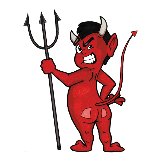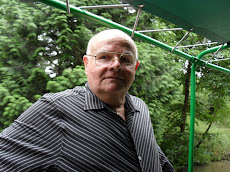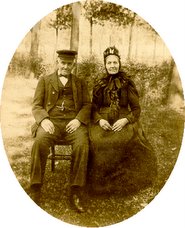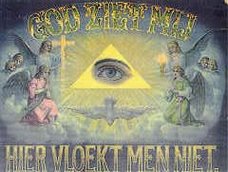Part of a - probably too - fiery pamphlet which I wrote a couple of years ago. At that time, I could not be bothered with nuances - but basically I still stand by what I wrote. Maybe some day I will translate it in English.De wereld valt in stukken uiteen - de nieuwe religie van de Heiligmakende en Miraculeuze Markteconomie die alle problemen oplost, slikt alle andere structuren op, socialisme, communisme en de rooms-katholieke kerk inbegrepen. Onverschilligheid en oppervlakkigheid, vervlakking en de dollar-verlosser beheersen het tijdsbeeld met de hulp van de caricaturale god van Bush die niet de christelijke God niet is, maar de ideale voorzitter van de republikeinse partij van Amerika.
De markteconomie steunt niet op een gegronde economische analyse, maar op dogmas, en op het feit dat, tot nu toe, andere systemen het hebben laten afweten, dikwijls omdat zij van hun oorspronkelijk economisch-sociaal opzet waren afgeweken. Maar nu wordt het kind met het badwater weggegooid : economische en financiële macht vervangen de menswaardigheid : de wereld draait rond macht en geld en niet rond de mens en de mens ondergaat de gevolgen.
Het is godgeklaagd te zien hoe de vakbonden mee-officiëren in de liturgie van de markteconomie, die, indien zij vrij spel krijgt, alle problemen oplost als een alwetende god ; en hoe sociale leiders zich laten inpakken door roofdieren, alias managers van internationale bedrijven, die in feite de ultra-egoistische hogepriesters van de nieuwe godsdienst van het vrije westen zijn, waar het dollar teken het kruis vervangt. Wat telt is de winst van het volgende kwartaal, en sociale slachtingen zijn een logisch en zeer aanvaardbaar, meestal zelfs gewenste gevolg. Wat is er aangenamer dan andere mensen in het vergeethokje te duwen ? Nieuwe economie ? Nee, een nieuwe versie van de catch as catch can, gepresenteerd met een religieus sausje, waarbij alle ketters die niet geloven in de almacht van de vrije markt-economie naar de brandstapel moeten worden gevoerd.
De misbruiken van de middeleeuwse roofridders, later aristocratie genaamd, van de verschrikkelijke slavernij, en de uitbuiting van de arbeidende mens door de eerste industriële revolutie, vervallen in het niets door de wandaden van de nieuwe hogepriesters-zakkenvullers van de kenniseconomie en van de informatica. Nu pas zullen miljoenen mensen werkelijk afgestoten worden in een proletariaat, waarvan de toestand nog dramatischer zal worden wanneer de ganse hocus-pocus van de vrije markt in mekaar zal storten, zoals onvermijdelijk zal en moet gebeuren. Nooit zijn er meer valse profeten geweest dan nu, gecarabineerde steenezels, gemeenlijk management goeroes genoemd, die één enkel idee - hoe irrelevanter hoe beter - uitmelken tot meerdere eer en glorie van hun eigen portemonnaie. Nooit is de minachting voor de mens zo groot geweest als nu ; nooit zullen de sociale en economische verschillen zo groot geweest zijn wanneer de Vrije Markt inderdaad tot god van de wereld word uitgeroepen. Deze godsdienst zal voor een grote meerderheid van de mensen zorgen dat de hel op aarde geinstalleerd wordt en zij niet meer moeten wachten tot na hun dood. Nooit zijn er meer roofridders geweest dan nu, die, zich verbergend achter de principes van de nieuwe godsdienst, de wereld en de kleine mens meer uitzuigen. En nooit hebben ze meer bijval gehad, omdat de kleine garnalen, zelfstandigen, middenkader en “hoger” kader, een eufemisme voor onmacht dat de werkelijke macht bijzonder weinig kost en resulteert in een horde van gewillige meelopers, denken dat ze ook eens goed in de grote pot zullen mogen graaien. De eerste aartsengel van de nieuwe markteconomie heet Hebzucht. Of hoe de democratie verwordt tot een schijndemokratie waar bedrijven - particuliere belangen - het halen van het algemeen belang, en hoe miljoenen politiek vrije mensen tot economische slaven worden gemaakt.
De enige reden waarom de markteconomie zo succesvol kon worden is dat allen die aan of kortbij de pot zitten denken dat zij er merkelijk beter van zullen kunnen worden, mais "les dés sont pipés" : enkel de hogepriesters kunnen onbevangen stelen zoveel als ze willen. Hebzucht heeft het naieve (?) geloof in een betere wereld vervangen.













